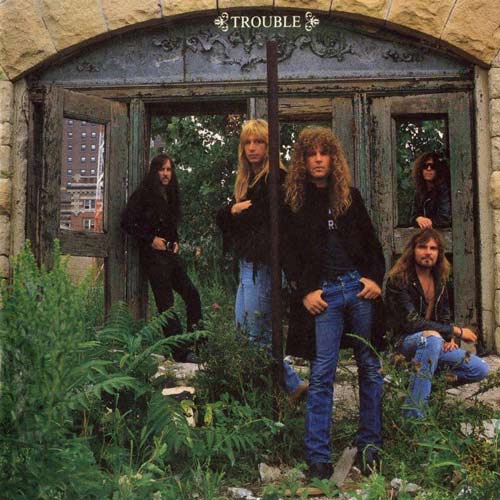Where have you been all my life? - 96%
Trouble is an awesome band. During a time when the metal underground was getting all caught up in one-upping the heaviness by adding speed (nothing wrong with it, to be clear), Trouble stepped it up by throwing down slow, crushing, almost impossibly heavy riffs, much like their heroes, Black Sabbath. Few question the colossal impact 1984’s Psalm 9 had on the metal scene, and that album is quite possibly the best thing Christianity has to offer besides forgiveness of sins. Somehow, though, Trouble seemed to have lost it as the 80’s rolled on. The Skull was a sure-footed step backwards, and though I haven’t listened to Run to the Light the general consensus is that it’s even worse. Jumping forward a few years, and the Chicagoan quintet find themselves looking to make a comeback and with Rick Rubin as a producer. Now, in metal, Rick Rubin trying to produce a comeback album is like Stephen Hawking trying to ride a bicycle. Not going to end well. More over less, the odds were stacked against this 1990 release from the start.
Now when you’re making a comeback album, you essentially have two choices: alter your sound further or go back to your roots. It’s sort of a “damned if you do, damned if you don’t” affair - if you further alter your sound you are labeled as a sellout and if you go back to your roots fans peg you for failing to create a note-for-note recreation of your original sound. Trouble chose the former on this album, creating a truly unique blend of bluesy stoner rock, traditional doom, and even thrash metal. Probably the biggest difference between this album and earlier Trouble is the fact they sped everything up about 40 BPM. Nevertheless, this album is still pound for pound as heavy as Psalm 9. It has more than enough high-quality tracks to ensure multiple listens. Whether it’s the badass, laidback opener At the End of My Daze, the Sabbath worshiping and cowbell sporting Psychotic Reaction, or the balls to the wall thrashing dreamstate of E.N.D., Trouble captures the listeners attention and never lets it go. The best track on this album is R.I.P., which combines the monolithic riffing style of Psalm 9 with the band's newfound affinity for thrash, and an infectiously catchy chorus to boot.
On a technical level, this album is well produced and well mixed. Maybe I was being too hard on the man earlier, because Rick Rubin did a heck of a job producing (it was a great idea to push the guitars up a notch to create a thick, heavy atmosphere). Barry Stern's drumming comes across as flawless on this album, as well as Eric Wagner's doom-laden wails and shrieks.
This album is not Psalm 9, but honestly, who cares? It’s quite a pity that this album is the hardest full-length Trouble album to find because S/T could very well be the best effort Trouble has put forward. You aren’t going to find such a masterful combination of heavy riffs and bluesy attitude without the CD cover having the label “Black Sabbath” anywhere else.

gem lost in the haze - 96%
Trouble's debut album did great things for metal and remains one of the darkest, thrashiest doom albums to date. A lot of things can change in six years, especially when you're talking metal and the dates are 1984 and 1990. The decade may have changed them, but not in a way that suggests decay or a decline in the quality of their resolve or their skill as musicians and performers. On the contrary, Trouble's 1990 self-titled release is arguably their most mature, boasting a fleshed out sound with unparalleled songwriting, a great production, and the time-crafted vocals of Eric Wagner which had improved drastically in the years since their previous efforts. All of this culminates in what is my mind the most "complete" thing Trouble ever created.
From the mid-paced chug of a killer opener in "At the End of My Daze" to the last notes of "All Is Forgiven", I can't see filler or anything resembling a weak link. The riffs here are some of the best ever written, by Trouble or anyone else; every song has a manically awesome main riff that demands a display of headbanging. Riffs are undoubtedly the point of focus here; they make the songs, and they're a timeless variety of great. Also, the interplay between guitarists Bruce Franklin and Rick Wartell is some of the best lead work you'll hear this side of the dueling NWOBHM of Dave Murray and Dennis Stratton on Iron Maiden's own self-titled (high praise!).
One potential complaint with the self-titled (maybe the reason it's so ignored) is that it's no Psalm 9 sequel. Trouble basically reinvented themselves with this release, and while I think it was a fantastic rebirth, those who aren't so keen on the laid back stoner vibe they chose to adopt may not see it as a rejuvenation, but a step back (they did go from doom and gloom to collectively embracing their inner acid dropping free love hippie, after all). But the metal remained fully intact! And as I've said, I think this is Trouble at their best. What it may lack in originality and innovation is more than made up for in simple quality. Judas Priest's Painkiller is jumping out at me; that's not a bad comparison. A leader of bands paves the way and then steps aside to create something that will serve as an example of how to improve upon an established formula: that is, by doing it really damn well.
Highly recommended.

